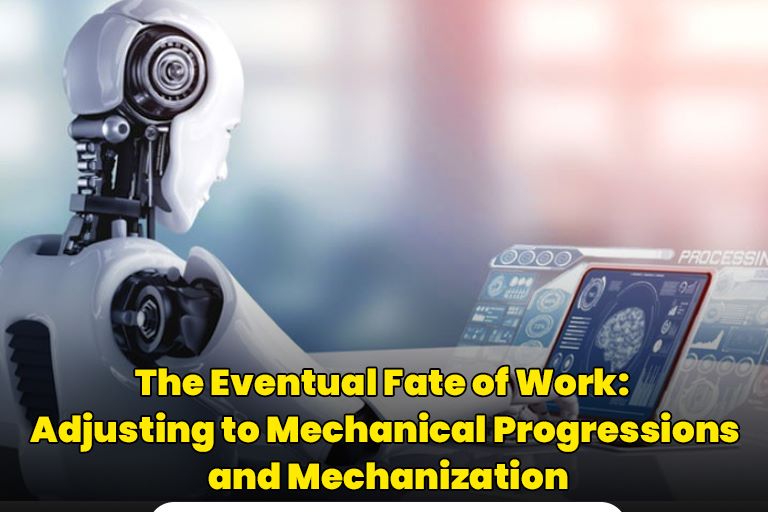As innovation keeps on progressing at an extraordinary speed, the fate of work is being formed by wonderful developments and the developing impact of robotization. From man-made reasoning (simulated intelligence) and AI to mechanical technology and the Web of Things (IoT), these innovative progressions are upsetting businesses and testing the customary ideas of work. In this article, we will investigate the likely effect of these turns of events and examine how people, associations, and social orders can adjust to flourish in the advancing scene of work.
- Embracing Robotization:
Robotization, driven by computer-based intelligence and advanced mechanics, can change different enterprises, affecting both daily practice and complex undertakings. While there are worries about work removal, the eventual fate of work will probably include a shift towards human-machine cooperation. Monotonous and commonplace assignments will be robotized, opening up human laborers to zero in on more imaginative, complex, and key exercises. To adjust to this shift, people should foster abilities that supplement computerization, for example, decisive reasoning, critical thinking, and the capacity to understand individuals on a deeper level.
- Upskilling and Reskilling:
To stay pertinent in a mechanically progressed work environment, upskilling is fundamental to reskilling will. Long-lasting learning will turn into the standard as people adjust to new advances and developing position necessities. Bosses, instructive foundations, and legislatures should team up to make powerful preparation programs and give available learning potential open doors. This will empower laborers to get new abilities and explore the changing requests of the gig market.
- Remote Work and Adaptability:
The Coronavirus pandemic has sped up the reception of remote work, prompting a significant change in they way we see and take part in work. The future will probably see a mixture model of work, consolidating remote and on-location work plans. Innovation empowers consistent cooperation across geological limits, offering more prominent adaptability and balance between fun and serious activities. In any case, associations should address difficulties connected with network protection, mental prosperity, and keeping a feeling of local area and cooperation in a virtual climate.
- Entrepreneurship and the Gig Economy:
Innovative progressions have likewise prepared for the ascent of the gig economy, portrayed by transient agreements and independent work. People can use computerized stages to autonomously offer their abilities and administrations. The fate of work might observe a flood in business as people look for independence, adaptability, and the capacity to seek different revenue sources. State-run administrations and associations should adjust arrangements and guidelines to guarantee fair treatment and security for gig laborers.
- Ethical Contemplations:
As robotization and simulated intelligence become progressively incorporated into the work environment, moral contemplations become principal. It is significant to guarantee that innovation is created and carried out dependably, resolving issues of inclination, protection, and straightforwardness. Associations should lay out moral rules and structures to oversee the utilization of man-made intelligence and computerization. Moreover, policymakers need to expect and address the likely cultural effect of innovative headways, including pay disparity and occupation polarization.
- Human-Driven Abilities:
As robotization assumes control over routine errands, human-driven abilities will turn out to be progressively important. Abilities like compassion, imagination, and decisive reasoning will be sought after. These remarkably human characteristics empower people to explore complex social associations, give customized client encounters, and tackle issues innovatively. Accentuating the advancement of these abilities through schooling and preparation will assist people with staying cutthroat later in the work market.
- Collaborative Labor force:
The fate of work will be portrayed by a cooperative labor force that rises above customary hierarchical limits. Innovation works with consistent correspondence and cooperation among groups spread across various areas and time regions. Virtual gatherings, projects on the executive's devices, and shared stages empower constant coordinated effort and bridle the aggregate insight of different people. Coordinated effort abilities, including virtual collaboration and multifaceted correspondence, will become irreplaceable.
- Workplace Adaptability and Prosperity:
Working environment adaptability goes past remote work plans. It envelops adaptable hours, results-based execution assessments, and obliging individual work inclinations. With progressions in innovation, representatives can have more noteworthy command over their plans for getting work done and conditions, prompting further developed balance between serious and fun activities and upgraded prosperity. Bosses ought to focus on representative prosperity by cultivating a steady culture, advancing psychological wellness mindfulness, and giving assets to telecommuters.
- The Job of Administration:
In store for work, successful administration will be essential in exploring the intricacies of mechanical progressions and computerization. Pioneers should embrace change, rouse development, and cultivate a culture of constant learning. They ought to engage their groups, support flexibility, and make a place of refuge for trial and error and chance-taking. Pioneers who can explore the moral predicaments related to robotization and focus on the turn of events and prosperity of their representatives will drive progress later on in the work environment.
- Socioeconomic Ramifications:
The effect of innovative progressions on society goes past the work environment. It is fundamental to consider the more extensive financial ramifications to guarantee a fair and impartial future. States and policymakers should address expected difficulties, for example, work uprooting and pay imbalance, through friendly security nets, retraining programs, and comprehensive strategies. Moreover, cultivating advanced education and connecting the computerized separation will be pivotal in guaranteeing equivalent admittance to open doors made by innovation.
- Continuous Variation:
Coming soon for work, flexibility will be a vital property for people and associations. The fast speed of innovative progressions implies that abilities and information can immediately become obsolete. In this manner, people should embrace a mentality of consistent learning and flexibility to remain significant. Associations ought to cultivate a learning society that urges representatives to gain new abilities, try different things with arising innovations, and adjust to changing business sector requests.
- Augmented Insight:
Instead of exclusively zeroing in on computerization and man-made intelligence supplanting human laborers, the fate of work will observe the ascent of expanded knowledge. Expanded knowledge alludes to the joint effort among people and computer-based intelligence frameworks to improve independent direction and efficiency. Man-made intelligence can deal with huge measures of information, distinguish designs, and give bits of knowledge, while people contribute to setting instinct, and moral judgment. The mix of human and computerized reasoning will prompt more educated independent direction and inventive critical thinking.
Conclusion:
The fate of work is being reshaped by fast innovative progressions and robotization. Embracing change, developing versatility, and cultivating a culture of constant learning will be urgent for people and associations to flourish. Increased insight, improved efficiency, and worldwide cooperation offer colossal open doors for development and development. By outfitting the capability of innovation while focusing on the prosperity and improvement of people, we can make an eventual fate of work that is both prosperous and human-focused. The vital lies in our capacity to embrace innovation as an empowering agent, adjust to its advancing scene, and influence driving positive change potential.
Read more - Utilizing Man-made Reasoning for Upper Hand in Business Read more - Methodologies for Exploring Dubious Monetary Times
